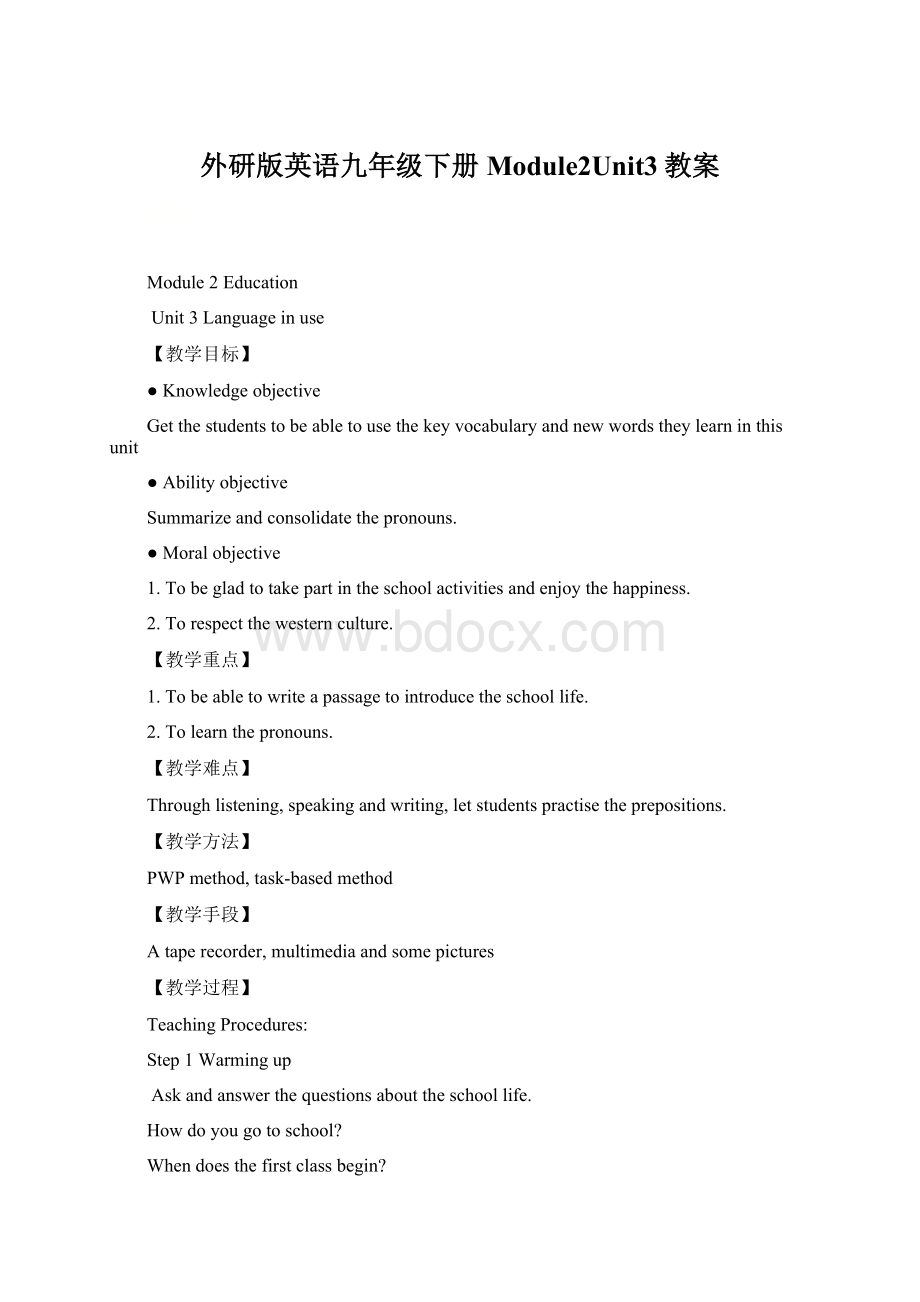外研版英语九年级下册Module2Unit3教案.docx
《外研版英语九年级下册Module2Unit3教案.docx》由会员分享,可在线阅读,更多相关《外研版英语九年级下册Module2Unit3教案.docx(9页珍藏版)》请在冰豆网上搜索。

外研版英语九年级下册Module2Unit3教案
Module2Education
Unit3Languageinuse
【教学目标】
●Knowledgeobjective
Getthestudentstobeabletousethekeyvocabularyandnewwordstheylearninthisunit
●Abilityobjective
Summarizeandconsolidatethepronouns.
●Moralobjective
1.Tobegladtotakepartintheschoolactivitiesandenjoythehappiness.
2.Torespectthewesternculture.
【教学重点】
1.Tobeabletowriteapassagetointroducetheschoollife.
2.Tolearnthepronouns.
【教学难点】
Throughlistening,speakingandwriting,letstudentspractisetheprepositions.
【教学方法】
PWPmethod,task-basedmethod
【教学手段】
Ataperecorder,multimediaandsomepictures
【教学过程】
TeachingProcedures:
Step1Warmingup
Askandanswerthequestionsabouttheschoollife.
Howdoyougotoschool?
Whendoesthefirstclassbegin?
Howmanylessonsarethereinthemorning?
Whatdoyouusuallydoonweekends?
Step2Languagepractice
Payattentiontothesentences.
1.Itookthemmyself.
2.Sooursisabitbigger.
3.Everyoneiswearingajacketandtie!
4.Wegotoschooleveryweekdayfrom8:
45amto3:
15pm.
5.Wehavealargesportsgroundforfootballandtennis,wherewecanplaybothduringandafterschoolhours.
Step3Grammar1:
代词
代词有人称代词、指示代词、物主代词、反身代词、不定代词和疑问代词等。
人称代词:
主格:
I,you,she,he,it,we,they
宾格:
me,you,her,him,it,us,them
指示代词:
this,these,that,those
物主代词:
形容词性:
my,your,her,his,its,our,their
名词性:
mine,yours,hers,his,ours,theirs
反身代词:
myself,yourself,herself,himself,itself,ourselves,yourselves,themselves
不定代词:
some,any,both,either,neither,all,none,each,every,many,much,few,afew,
little,alittle,other,another,one,somebody,nobody,anybody,everyone,everything,something,anything,nothing等
疑问代词:
what,which,who,whom,whose等
Grammar2:
不定代词
1.some&any
都表示“一些”,可指可数名词和不可数名词。
可做主语和宾语。
some多用于肯定句,any多用于否定句、疑问句和条件句。
e.g.SomeofthestudentscanspeakGerman.
2.neither&none
都表示否定意思,区别在于:
neither表示对两者的否定,而none表示对三者及以上的否定。
e.g.Isawtwoboysatthedoor,butneitherofthemismybrother.
Noneofthestudentsinmyclasswants/wanttotakepartinthistrip.
3.(a)little&(a)few
alittle和afew表示肯定的概念,而little和few表示否定的概念。
e.g.LittleisknownabouttheseareasofMars.
Hehasmanyfriends,butfewaretruefriends/butonlyafewaretruefriends.
此外,(a)little用于不可数名词,而(a)few用于可数名词。
4.both&and
both表示“两者都”,而all表示“全体,一切”,指三者及以上,all还可以指不可数的事物。
e.g.Alloftheboyswenttothecinemayesterdayevening.
—Whichofthetwoshirtsdoyoulike?
—Ilikeboth.
both和all还可以用于主语后。
e.g.Weboth/allpassedtheexam.
5.each&either
都表示“每一个”,each可以表示两者或两者以上中的“每一个”。
而either只能表示两者中的“每一个”。
e.g.Eachofus/Weeachgotabeautifulcardonthatspecialday.
-Whichofthetwoshirtsdoyouwant?
-Eitherwilldo.
注意:
either表示二选一,表示两者都要用both。
6.疑问代词
疑问代词用于构成特殊疑问句,包括what,which,who,whom,whose等,代词的选择根据句意要求而定。
e.g.Whendoyouhearabellatschool?
WhatareEnglishschoolslike?
HowmanypupilsarethereinaclassinEngland?
Step4Underlinethecorrectwords.
1.Readthedialoguecarefully.
Anna:
Hi,Bob.Howdidyourexamsgolastterm?
Bob:
Great!
Igotgoodmarksin
(1)both/eachmathsandgeography.Whataboutyou?
Anna:
IdidreallywellinEnglish.That’s
(2)anything/somethingI’vealwaysenjoyed.
Mymarksinhistoryandartweren’tsogoodbecause(3)none/neitherismyfavoritesubject.Whatwillyoustudythisterm?
Bob:
I’vestillgot(4)afew/fewdaysbeforeIhavetodecide.I’mgoingtospeakto(5)both/allmyteachersandaskfortheiradvice.
Anna:
Theteacherssaythatwemustdecidefor(6)themselves/ourselvesandthat(7)none/neitherofthemcantelluswhattodo.
Bob:
ButIhavetoget(8)some/anyinformationbecausethereareso(9)much/manysubjectsandit’sveryhardtochoose.
2.Choosethecorrectonefromthetwowords.
Keys:
both,something,neither,afew,both,ourselves,none,some,many
Step5Completethepassagewiththewordsandexpressioninthebox.
Readthepassageandchoosetherightones.
both,each,other,his,mine,myself
Agoodteacherissomeonewhoishelpfulandkind,likemyhistoryteacher,MrMiller.
(1)____knowledgeofthesubjectisexcellent.Becauseofhim,Ilovehistoryandevenreadhistorybooksby
(2)______afterthelessons.Afriendof(3)_____calledMarkalsolovesthissubjectandsometimeswelend(4)_________booksorDVDsabouthistory.Ilikereading(5)_____WesternandChinesehistorybooks,butIthinkChinesehistoryismyfavoritesubject.
Keys:
His,myself,mine,eachother,both
Step6Completethesentenceswiththecorrectformofthewordsinthebox.
heherhimhimselfourshetheirthemselvestheyuswe
1.John’shomeworkistoodifficult.____isnotabletodoit_______,soI’mgoingtohelp_____withit.
2.Somepeopledonothavetimetowash_____pets__________,so_____paysomeonetodoitatthepetshop.
3.—Janeisdoingaprojectaboutfamilyhistory.____hasaskedustogive____someof____photosthatweretakenwhenwewereyoung.Have____gotany,Betty?
—Yes,thereisaphotoof_____withallthechildreninourfamily.
Keys:
He,himself,him,their,themselves,they,She,her,our,we,ours
Step7Grammar3:
介词和介词短语
介词是一种用来表示人物、事件之间关系的词。
1.介词短语及用法
不能单独构成句子成分,必须以介词短语的形式来构成。
“介词+名词”构成的介词短语在句中可作状语、定语和表语等。
1)作状语
e.g.Hewrotelongpoemsforchildren.
2)作定语
e.g.Heseemstoknowthesolutiontotheproblem.
3)作表语
e.g.TomandJackarefromEngland.
2.介词的兼词现象
有些单词既可做连词也可作介词,而有些单词既可作介词又可做副词,要注意区分它们在句中的不同功能。
1)after&before
After和before既可作连词,也可做介词。
作连词时后接从句,作介词时后接名词或动词的ing形式。
e.g.Whatdidyoudoafteryoucalledthepolice?
(after为连词,连接状语从句)
Iamgoingtotheplaygroundtoplaybasketballafterschool.
(after为介词,与名词school构成介词短语作状语)
2)above&below
above和below可作介词,也可做副词。
e.g.Donotwritebelowtheline.(below和theline构成介词短语作状语)
Pleasewritetomeattheaddressbelow.(below为副词)
这类兼做介词和副词的单词很多,如:
about,down,up,in,off,on,over,through,under等。
Step8Completethepassagewiththewordsinthebox.
Theschoolcinemashowslotsofforeignfilms.Nextweek
(1)____FridayandSundayitisshowingaFrenchfilmcalledNeverSayGoodbye.Thestoryisset
(2)____Paris(3)____the1960s.Thefilmlaststwohoursandfifteenminutesandstarts(4)____6:
30and9:
30(5)____theevenings.Ticketsare£5,butthereisaspecialhalf-priceticket(6)____studentsfromourschool.Pleasebringyourstudentcardifyouwantacheapticket.
Keys:
on,in,in,at,in,for
Step9Completethesentencessotheyaretrueforyou.
Completethesentencesaccordingtoyourownschoollifeandshowthemtoyourclass.
1.Istudy_______subjects:
English,___________________________________.
2.Idon’tstudy_____________________________.
3.Itakeexamsin____________,butIdon’ttakeexamsin___________________.
4.Myfavoritesportis_______________because____________________.
5.Iusuallyplaysportson____________________.
6.After-schoolactivities,suchas______________areverypopularatourschool.
Step10Listening
1.Listenandanswerthequestions.
1)WheredoesKatewanttogoonholidaynextyear?
2)WhatgamehasPeteplayedsinceprimaryschool?
3)WhendoKateandPetehavesportspractice?
2.Listenagainandcompletethetable.
Schoolyear
Specialsubject
Club
Sport
Planfornextyear
Kate
Pete
3.ListentoPart8andanswerthequestions.
1)Whendoclassteacherscheckwhoispresentorabsent?
2)DoallthestudentstakePElessons?
Keys:
Atthestartoftheday.
Yes,theydo.
Step11Readthepassageandsaywhereyouthinkitcomesfrom.
Readthepassagecarefullyandchoosetherightone
a)Adictionary.
b)Aschoolwebsite.
c)Astorybook.
Keys:
b
Step12Nowmatchtheheadingswiththeparagraphs
Clubs,Schoolhours,Sports,Subjects
Keys:
3,1,4,2
Step13Readthepassageagainandcheckthetruesentences
1.TheheadteacherspeakstothewholeschoolonFridays.
2.Thelunchbreakislessthanonehour.
3.Studentstakeexamsinallthesubjectstheystudy.
4.Studentscanjoinmorethanoneclub.
Keys:
4
Step14Aroundtheworld
Talkabouttheeffectoftheeducationalenvironment.
Step15Writing
1.Workinpairs.Discussandwritesentencesaboutyourschool.
•Writesentencesaboutthefacts.
Thereare…studentsand…teachersinourschool.Studentscanstudy…
Afterschool,thereare…and…
•Writesentencesaboutyouropinions.
ThethingIlikebestaboutourschoolis…because…
2.Makealeafletaboutyourschoolfornewstudents.
Makealeaflettointroduceyourschooltonewstudents.UsethesentencesinActivity10.
Drawpicturesandmakedesignswherenecessary.
Step16Exercises
1.AuntTinawillvisitussoon._____isarrivingtomorrowmorning.
A.HeB.SheC.HisD.Her
2.Atpresent,childrenmean_____tomostparentsinChina.
A.everythingB.nothing
C.anythingD.something
3.We’llplaybasketball_____Class3tomorrow.
A.overB.against
C.toD.for
4.—Howcanweprotectourselves_____theearthquake?
—Weshouldstaycalmfirst.
A.withB.about
C.forD.from
Keys:
B,A,B,D
Step17中考链接
1.Inourschool,_____studentslikeEnglish,but_____ofthemcanspeakEnglishsmoothly.【2019铜仁】
A.alittle;afewB.afew;few
C.afew,littleD.alittle;few
2.—Whichofthetwomagazineswillyoutake?
—I’lltake_____thoughIfind_____ofthemareveryusefultome.【2019黄冈】
A.all;bothB.either;either
C.either;neitherD.either;both
3.____ofuswantstogototheparktoday,becausewehavetofinishsomuchhomework.【2019长沙】
A.EitherB.BothC.Neither
4.Youcantake____ofthetwotoycarsandleavetheotherforyourbrother.【2019安徽】
A.bothB.none
C.eitherD.neither